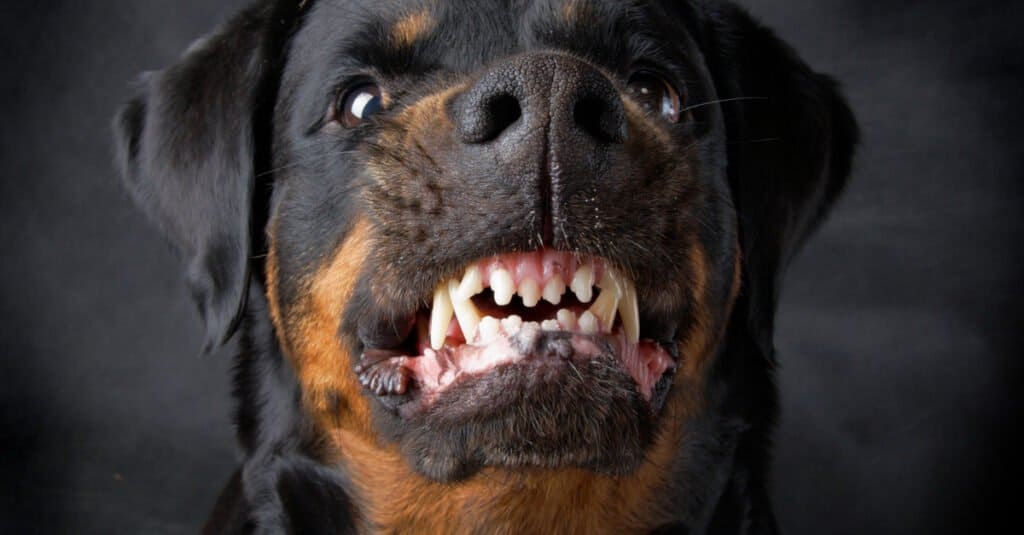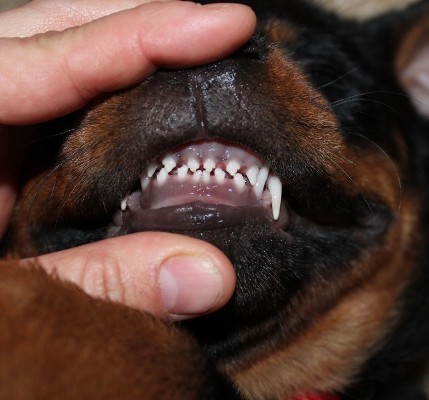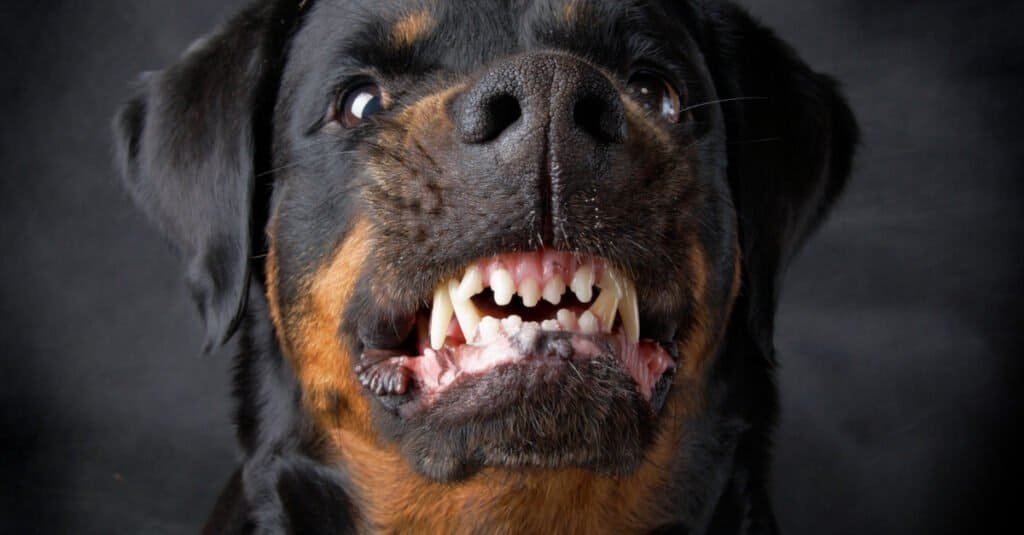Hey there! Are you curious about whether Rottweiler puppies’ teeth fall out? Well, let’s sink our teeth into this fascinating topic!
As Rottweiler puppies grow, their little chompers go through some exciting changes. Just like human babies, these adorable furballs experience a teething process that involves their baby teeth falling out. But don’t worry, it’s completely normal, and it’s all part of their journey to becoming strong, healthy adults.
So, why do Rottweiler puppies’ teeth fall out? Well, it’s because their adult teeth are ready to make their grand entrance! Similar to human children losing their baby teeth, Rottweiler pups gradually lose their baby teeth to make way for their permanent, stronger teeth. It’s like nature’s way of giving them a toothy upgrade!
So, stay tuned as we dive deeper into the teething journey of Rottweiler puppies and answer all your burning questions! Whether you’re a Rottweiler owner or just a curious pet lover, we’ll uncover everything you need to know about those adorable little teeth falling out. Let’s get started on this exciting adventure!

Do Rottweiler Puppies Teeth Fall Out?
When it comes to raising a Rottweiler puppy, many owners have questions about their dental health. One common concern is whether their teeth will fall out during the teething process. In this article, we will explore the teething stages of Rottweiler puppies, why their teeth may fall out, and how to properly care for their dental health.
The Teething Stages of Rottweiler Puppies
Like all puppies, Rottweiler puppies go through a teething process as their adult teeth start to come in. This typically begins around 3-4 months of age and can last up until 7-8 months. During this time, you may notice your puppy chewing on anything they can get their paws on, from toys to furniture. This is a natural instinct that helps soothe their gums as they go through the discomfort of erupting teeth.
It’s important to note that during the teething process, puppies will lose their baby teeth. This is completely normal and necessary for the development of their adult teeth. As the adult teeth push up from beneath the gumline, the baby teeth will start to loosen and eventually fall out. In most cases, the baby teeth will be swallowed or fall out while chewing on toys, and you may not even notice.
However, there are situations where a puppy’s baby teeth may not fall out as the adult teeth come in. This can lead to overcrowding and dental issues down the line. If you notice that your Rottweiler puppy has retained baby teeth or if you see two teeth occupying the same space, it’s important to consult with a veterinarian as extraction may be necessary to prevent future dental problems.
Why Do Rottweiler Puppies’ Teeth Fall Out?
The primary reason for a Rottweiler puppy’s teeth falling out is the eruption of their adult teeth. As the adult teeth grow in size underneath the gums, the root of the baby teeth is absorbed, causing them to become loose and eventually fall out. This process allows the adult teeth to take their place.
It’s important to note that the timeline for when a Rottweiler puppy’s teeth fall out may vary. Some puppies may lose their teeth earlier than others. It’s not uncommon for puppies to have missing teeth during the teething process, and this doesn’t necessarily indicate a problem. However, if your puppy is experiencing excessive pain, bleeding, or a lack of appetite during the teething process, it’s best to consult with a veterinarian to rule out any underlying issues.
Another characteristic of the teething process in Rottweiler puppies is the appearance of molars. While the incisors and canines are the first teeth to fall out, the molars make their appearance later. It’s important to continue monitoring your puppy’s dental health even after the initial round of teeth fall out to ensure all adult teeth are coming in properly.
Caring for the Dental Health of Rottweiler Puppies
To ensure the dental health of your Rottweiler puppy, it’s crucial to establish a dental care routine from an early age. Here are some tips to help you keep their teeth clean and healthy:
- Brush their teeth regularly: Start brushing your puppy’s teeth with a soft toothbrush and dog-friendly toothpaste as soon as their adult teeth start to come in. Gradually increase the brushing time to a couple of minutes a day.
- Provide dental-friendly toys and treats: Offering chew toys specifically designed to promote dental health can help soothe your puppy’s teething discomfort and also remove plaque and tartar buildup.
- Regular dental check-ups: Schedule regular check-ups with your veterinarian to monitor your puppy’s dental health, identify any issues early on, and address them promptly.
By following these practices, you can help ensure that your Rottweiler puppy’s teeth stay healthy and strong as they transition into adulthood. Remember, a proper dental care routine not only protects their oral health but also contributes to their overall well-being.
Common Dental Issues in Rottweiler Puppies
While Rottweiler puppies generally have strong dental health, there are some common dental issues that can occur. Being aware of these issues can help you identify them early and seek appropriate treatment. Here are a few common dental problems seen in Rottweiler puppies:
1. Retained Baby Teeth
As mentioned earlier, retained baby teeth can occur when the adult teeth start to come in, but the baby teeth do not fall out as intended. This can lead to overcrowding and misalignment of the adult teeth. If you suspect your Rottweiler puppy has retained baby teeth, it’s important to consult with a veterinarian to determine the best course of action, which may involve extraction.
2. Dental Malocclusion
Rottweilers, like other dog breeds, can sometimes develop dental malocclusion, which refers to an improper alignment of the teeth. This can result in discomfort, difficulty eating, and increased risk of dental issues such as tartar buildup and gum disease. Regular dental check-ups can help detect dental malocclusion early, and your veterinarian may recommend orthodontic treatment if necessary.
3. Gum Disease
Periodontal disease, also known as gum disease, is a common dental issue in dogs, including Rottweiler puppies. It is caused by the buildup of plaque and tartar on the teeth, leading to inflammation and infection of the gums. If left untreated, gum disease can progress and cause tooth loss and other serious health issues. Regular brushing, dental cleanings, and good dental hygiene practices are essential in preventing and managing gum disease.
4. Tooth Fractures
Rottweiler puppies are active and energetic, which can sometimes result in accidents or injuries that lead to tooth fractures. Fractured teeth can cause pain, sensitivity, and difficulty eating. In severe cases, extraction may be necessary. If your puppy experiences a tooth fracture, it’s important to seek veterinary attention as soon as possible for proper evaluation and treatment.
Tips for Maintaining Your Rottweiler Puppy’s Dental Health
In addition to establishing a dental care routine, there are several tips you can follow to maintain your Rottweiler puppy’s dental health:
1. Monitor their chewing habits:
Keep an eye on what your puppy is chewing on to ensure they have appropriate chew toys that promote dental health. Avoid giving them hard objects that can damage their teeth.
2. Offer a balanced diet:
Provide a well-balanced diet that supports your Rottweiler puppy’s dental health. Include foods and treats that are specially formulated to promote dental hygiene, such as those designed to reduce tartar buildup.
3. Regularly check their mouth:
Take the time to inspect your puppy’s mouth regularly. Look for signs of dental issues such as bad breath, excessive drooling, inflamed gums, or loose or broken teeth. If you notice anything concerning, consult with your veterinarian.
4. Stay consistent with dental care:
Consistency is key when it comes to your Rottweiler puppy’s dental care routine. Make brushing their teeth a part of their daily routine and stick to regular dental check-ups. Your furry friend will thank you for it.
By following these tips and practices, you can help ensure that your Rottweiler puppy grows up with a healthy and happy smile. Remember, proper dental care is an essential part of their overall well-being, and it’s never too early to start.
Key Takeaways: Do Rottweiler Puppies Teeth Fall Out?
1. Rottweiler puppies, like all puppies, have baby teeth that start to fall out around 4-6 months of age.
2. This process is natural and necessary for the adult teeth to come in properly.
3. It is important to provide appropriate chew toys and dental care during this time to support healthy teeth development.
4. If a puppy’s baby teeth don’t fall out on their own, it may require a veterinarian’s assistance to prevent dental issues.
5. Adult Rottweilers have 42 permanent teeth, including strong canines used for biting and tearing.
Frequently Asked Questions
Here are some common questions related to the dental development of Rottweiler puppies.
1. When do Rottweiler puppies start losing their baby teeth?
Rottweiler puppies usually start losing their baby teeth around the age of 4 to 6 months. This is a normal part of their dental development. Just like human children, puppies have a set of temporary baby teeth that eventually give way to their adult teeth. The process of losing baby teeth and having adult teeth come in can last several months.
During this time, you may notice your Rottweiler puppy’s gums becoming slightly swollen and sensitive. They may also chew on objects more often to alleviate discomfort. Providing appropriate chew toys and regular dental care during this transition can help alleviate any discomfort your puppy may experience.
2. How can I help my Rottweiler puppy during the teething stage?
During the teething stage, it’s important to provide your Rottweiler puppy with appropriate chew toys to help alleviate discomfort and prevent destructive chewing. Choose toys that are specifically designed for teething puppies and avoid toys that are too hard, as they may damage their teeth.
You can also massage your puppy’s gums gently with your finger or a cold, damp cloth to provide relief. Be sure to reward your puppy for chewing on appropriate items and discourage them from chewing on furniture or other inappropriate objects. Regular dental care, such as brushing your puppy’s teeth and providing dental treats, is also crucial during this stage to maintain good oral hygiene.
3. What should I do if my Rottweiler puppy’s baby teeth don’t fall out?
In some cases, Rottweiler puppies may retain their baby teeth even after their adult teeth have come in. This can cause dental problems and overcrowding. If your puppy’s baby teeth don’t fall out on their own, it’s recommended to consult a veterinarian.
The veterinarian will be able to assess the situation and determine if any baby teeth need to be removed to prevent complications. Leaving retained baby teeth in place can lead to misalignment of the adult teeth, which can cause issues with biting and chewing. Early intervention is important to ensure proper dental development.
4. Is it normal for Rottweiler puppies to have bad breath?
While some degree of puppy breath is normal, consistently bad breath in Rottweiler puppies can be a sign of dental problems. It’s important to regularly check your puppy’s mouth for signs of tartar buildup, red or swollen gums, or any other abnormalities. These could indicate issues such as gum disease or tooth decay.
If you notice persistent bad breath or any concerning dental symptoms, it’s best to consult a veterinarian. They can assess your puppy’s oral health and provide appropriate treatment or recommendations for maintaining good dental hygiene.
5. When should I start brushing my Rottweiler puppy’s teeth?
It’s recommended to start brushing your Rottweiler puppy’s teeth as early as possible, ideally when they are still young. This allows them to become accustomed to the process and makes it easier to maintain good oral hygiene as they grow older.
Use a soft-bristled toothbrush and specially formulated dog toothpaste. Start by gently massaging their gums and teeth with your finger, gradually introducing the toothbrush. Make the experience positive with treats and praise to create a positive association with toothbrushing. Aim to brush your puppy’s teeth at least a few times a week to remove plaque and prevent dental problems.

Summary
When you have a Rottweiler puppy, it’s normal for their baby teeth to fall out just like yours did. This process is called teething. It usually happens when they are around 3 to 6 months old.
During the teething process, your Rottweiler puppy might experience discomfort and want to chew on things to help with the pain. It’s important to provide them with appropriate chew toys to keep them from chewing on your furniture or belongings. Just like human children, their adult teeth will gradually replace their baby teeth, and they will have a strong and healthy set of teeth as they grow up.
Remember to be patient and understanding as your Rottweiler puppy goes through this natural process. With your love and care, their teething experience will be much smoother, and they will have a beautiful smile in no time.
